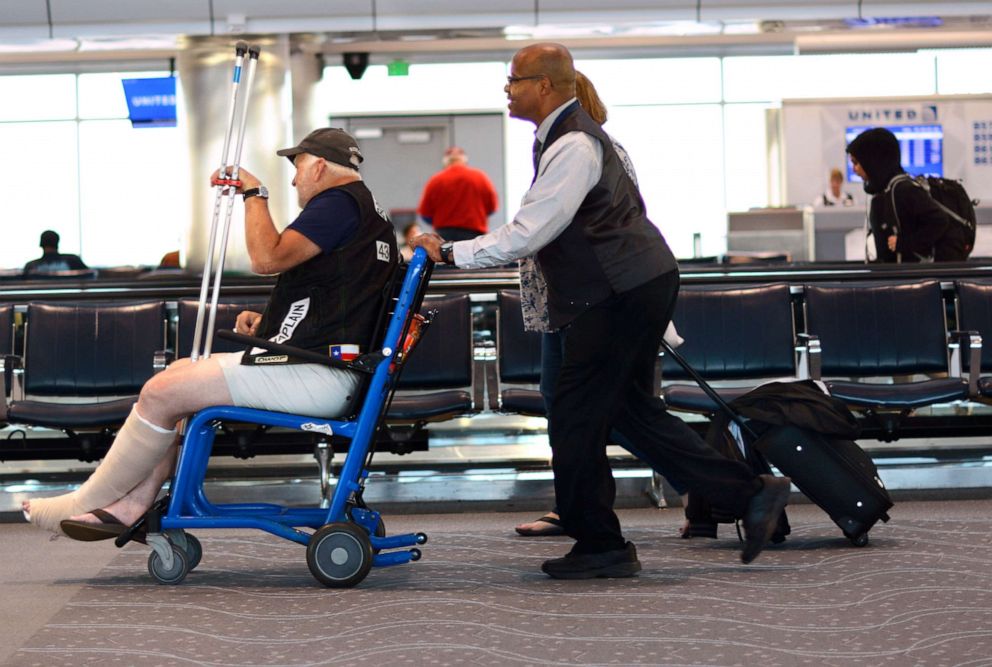Disabled veterans say they face intense struggles when flying and airlines often won't help
While many airline passengers will rush this holiday weekend to make their connecting flights, Shaun Castle, a paralyzed Army veteran, says he has been forced multiple times to crawl down the aisle of an airplane in order to make his next flight on time.
In July, after he said he waited more than 20 minutes for an aisle chair, a wheelchair designed specifically to fit in the aisles of airplanes for individuals with disabilities to board and disembark safely, Castle said he had no choice but to lift himself and drag his body along the floor to get off the plane.
“They knew I was coming and they still didn’t bring me an aisle chair,” Castle said. “I had to drag myself down the aisle, on my bottom, down the aisle to get to my day chair, to transfer myself back into my day chair, to get to my connecting flight, to get back to D.C., to testify before Congress,” he said in an interview with ABC News.
Castle, who was paralyzed in a training accident while stationed in Germany in 2003, is one of 61 million Americans with a disability that has a major impact on life activities, according to the Centers for Disease Control and Prevention, and he says stories like his are not uncommon.

“My story is one of hundreds of thousands of stories that have happened of people having to deal with broken wheelchairs, or being dropped, or having to transfer themselves down the aisle,” Castle told ABC News.
In 2014, Castle joined the Paralyzed Veterans of America (PVA), a congressionally-chartered veterans service organization, and has since risen to the role of deputy executive director where he has dedicated his life to supporting those with disabilities - regardless of whether they're veterans.
“The number one concern we hear at PVA is actually the air travel, that we are having problems, the airlines aren’t taking care of us well, they’re damaging our equipment,” Castle stated.
When most people think about travelling in a wheelchair, their first thought may be how much of a hassle it must be or how much extra time it must take. While both of those things may be true, Castle stressed that each “inconvenience” can bring serious medical consequences.
Castle told a story of one of the group’s members who had to take three months off work because he said he was left on the wrong chair and ignored. Because of incorrect support and placement, Castle said, the man developed sores on his legs which, if left unchecked, could be deadly for someone who is paralyzed.
And during the holiday season when air travel is the busiest, the risks involved in travelling home are often not worth the reward, he said.
“The vast majority of our board prefers to just drive or not go home for the holidays at all,” Castle explained. “They absolutely will forego going to our meetings, going on holiday travel, or just flat out say ‘I would rather drive 20 some hours and stop three different nights than have to get on an airplane and ride it for four hours.’”

Although the Americans with Disabilities Act (ADA) has been law for almost 30 years, and significant strides have been made in access and care for those with disabilities, air travel is one thing that the act does not cover.
Instead, a separate measure was crafted to specifically focus on the troubles associated with air travel for the disabled.
The Air Carrier Access Act (ACAA) was actually passed four years before the ADA. Despite this head start, however, Castle says airlines have failed to maintain even the basic standards that the act defines.
“Lavatory standards,” Castle listed as an example. “Those are something we’ve been pushing very hard for the last 30 years but they keep making them smaller even though the regulations are out there that say no you must make them bigger.”
Castle explained that airlines are able to get away with ignoring these regulations after a recent court decision ruled private individuals do not have the right to sue airlines for potential violations under the ACAA.
As such, individuals with disabilities have been forced to rely on name-and-shame tactics to achieve their goals.
In August, Karah Behrend, a retired Air Force senior airman and current wheelchair rugby player, went on Twitter to express her outrage at American Airlines for her wheelchair being damaged.
“You know what’s super cool? When you HAVE to trust people with your wheelchair, and then they lose an entire wheel. You can’t have a wheelchair without a wheel... Thanks @AmericanAir,” Behrend tweeted.
Behrend told ABC News she hadn’t heard from American Airlines after the incident, and said it wasn’t until she went on Twitter that someone from the airline responded.
Besides not having a way to get around, Behrend’s custom-made wheelchair she used to play rugby cost roughly $10,000 and would take a long time to properly replace. As of November, she said she has yet to receive a replacement from the airline.
“The airlines for some reason don’t understand that wheelchairs aren’t something to stack things on,” Behrend said. “Somebody stacked so much weight on it that it couldn’t hold its own anymore and it basically blew the wheel out.”
In fact, stories of mishandled wheelchairs, like Behrend’s, are so common that airlines are required by law to release monthly reports detailing the number of mishandled and damaged wheelchairs, among other items.
From January to this September, 7,747 wheelchairs and scooters were mishandled, or roughly 1.6 percent of all wheelchairs and scooters enplaned, according to an air travel consumer report released by the Department of Transportation.

While that 1.6 percent figure might not sound high, both Castle and Behrend say many cases are never reported.
“This isn’t the first time that’s happened,” Behrend said. “It was just one of the first times I went online with it.”
A representative from American Airlines, responding to a request from ABC News for comment, said its mission is to ensure customers of all abilities have a positive travel experience, although the airline admits it is a work in progress that they strive to improve.
Airlines for America, the trade association that represents many of the major North American airlines, responded by assuring U.S. airlines meet or exceed all DOT accommodation standards and provide safe and comfortable air transportation to thousands of passengers with disabilities every day.
“Why is it so hard for the Department of Transportation to do the right thing,” Castle asked. “You know what the right thing is, so do it.”





